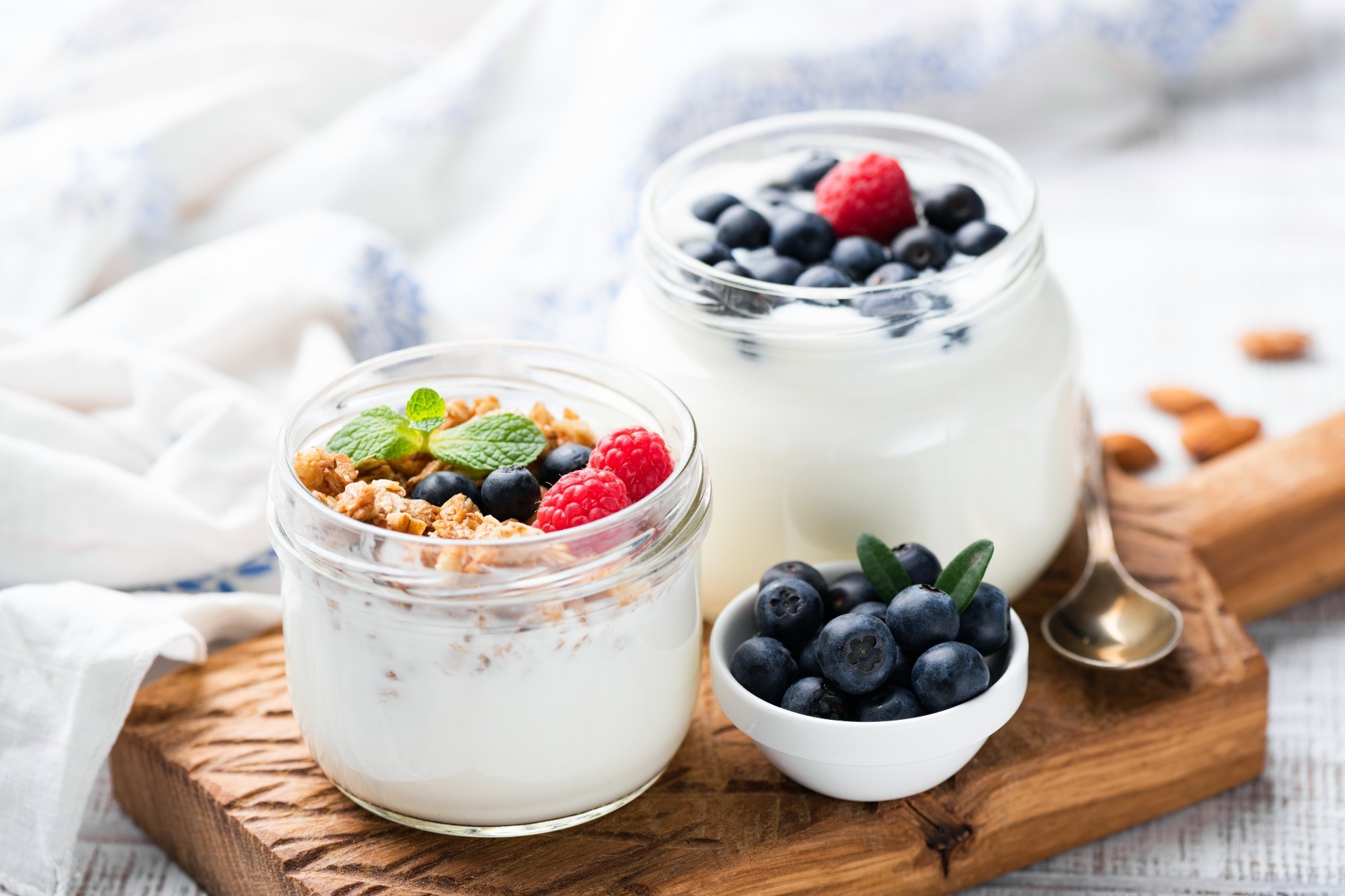In a recent review article published in the journal Nutrients, scientists discuss the nutritional value of yogurt as a protein source and its effects on skeletal muscle health.
Study: Nutritional Value of Yogurt as a Protein Source: Digestibility/Absorbability and Effects on Skeletal Muscle. Image Credit: Vladislav Noseek / Shutterstock.com
Background
Yogurt is a nutritious dairy product prepared by fermenting cow’s milk with lactic acid bacteria. The production of yogurt involves many processes, including homogenization, pasteurization, fermentation, and smoothing.
Yogurt with distinct physical properties can be prepared using a different combination of these processes. Furthermore, the physical and chemical properties of the same type of yogurt, such as hardness and viscosity, can be altered by changing its production conditions.
Yogurt is a widely recognized source of numerous probiotics with many health benefits. In fact, consuming yogurt can influence the composition of gut microbiota by reducing pathogenic microbial populations.
Additionally, yogurt exhibits immunomodulatory, anti-inflammatory, anti-diabetic, and cardioprotective properties. Yogurt is also a rich source of vitamins and minerals, short-chain fatty acids, and milk protein-derived peptides, all of which are associated with numerous health benefits.
Digestion properties of yogurt proteins
Whey and casein are the two main milk proteins present in yogurt. Most of these proteins are denatured during pasteurization and fermentation processes.
Whey protein is denatured during pasteurization and subsequently combines with casein micelles. During fermentation, the hydration of casein micelles leads to the formation of a homogeneous mesh-like structure, which becomes a soft white tissue. Whey proteins that do not combine with casein micelles remain in trapped water above the casein micelle network.
Overall, an alteration in the physical properties of milk proteins occurs during yogurt production, depending on the organization of casein micelles. The changes in physical properties of yogurt proteins make them suitable for easier absorption than milk proteins.
The bacterial strains used in yogurt fermentation can decompose and utilize the proteins as an amino acid source. However, recent evidence indicates that the pasteurization process and raw milk protein composition have a more significant influence on yogurt protein digestibility than the fermentation process.
Due to its higher viscosity, the rate of gastric clearance of yogurt is slower than that of milk. Some evidence indicates that the rates of digestion and absorption of yogurt and milk proteins primarily depend on the rate of gastric clearance and that both yogurt and milk proteins undergo rapid absorption once they reach the intestines.
In contrast, some studies have shown that yogurt proteins are digested and absorbed at a faster rate than milk proteins. Mechanistically, these studies have shown that gastric juice-mediated acidification of proteins can significantly influence their digestion and absorption. Moreover, fermented milk products with reduced viscosity, such as drinking yogurt, have been found to have higher digestion and absorption rates than products with high viscosity, such as Greek yogurt.
Impact of yogurt on skeletal muscle health
Fermentation of milk by lactic acid bacteria can increase its nutritional and health benefits. Yogurt consumption has been frequently associated with body weight gain and enlargement of the musculoskeletal system.
Using bio-labeled alanine, researchers have recently found higher rates of muscle protein synthesis after ingestion of yogurt as compared to after ingesting unfermented milk or acidified unfermented milk. Interestingly, yogurt has been shown to increase muscle protein synthesis without changing blood levels of amino acids or insulin.
Evidence indicates that yogurt increases the activation of the mammalian target of rapamycin complex 1 (mTORC1), a protein complex involved in protein, lipid, and purine synthesis, as well as the regulation of cell growth and metabolism. This could be a possible mechanism of yogurt-mediated muscle protein synthesis.
In one study investigating the outcomes of a 12-week weight loss program, researchers observed that an energy-restricted diet supplemented with yogurt is more likely to reduce body weight and body fat than the same diet supplemented with gelatin desserts. However, no change in fat-free mass has been observed in the yogurt-supplemented group. This indicates that yogurt might be useful in maintaining skeletal muscle mass during weight reduction.
Studies investigating the outcomes of weight gain training sessions have found that yogurt has a higher ability to increase fat-free mass and maximal muscle strength and reduce body fat than pudding containing isocaloric carbohydrates. However, both supplements have similar effects on weight gain.
Yogurt has been found to exert these beneficial effects by increasing the levels of positive regulators of skeletal muscle mass, such as insulin-like growth factor and follistatin, as well as reducing the levels of negative regulators, such as transforming growth factor-beta, growth/differentiation factor 15, activin A, and myostatin.
Skeletal muscle-related health benefits of yogurt might also be due to the anti-inflammatory effects of bacterial metabolites and products. In this context, studies have shown that supplementation of probiotics that are used in yogurt production can increase skeletal muscle mass and strength by increasing the production of short-chain fatty acids in the intestine.
Journal reference:
- Sumi, K., Tagawa, R., Yamazaki, K., et al. (2023). Nutritional Value of Yogurt as a Protein Source: Digestibility/Absorbability and Effects on Skeletal Muscle. Nutrients. doi:10.3390/nu15204366








